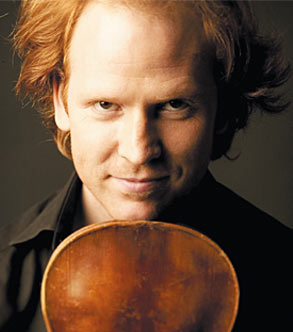The “Turning Point” in Colin Matthews’ so-named orchestral piece is a change of attitude, a sudden seriousness of purpose, a great effort of will to stop moving and take stock of where it - whatever it is - is going. That Matthews did actually stop mid-composition because, precisely as the piece tells us, he wasn’t sure he was enjoying the ride anymore is one of those extra-musical bits of information that perhaps holds the key to understanding the motivation behind it. Matthews says the piece wasn’t/isn’t about anything, that it’s an abstract and there’s an end of it. The listener may beg to differ.
Turning Point was written to a commission from the Royal Concertgebouw Orchestra of Amsterdam and that orchestra’s great tradition in Mahler and Matthews’ own involvement with Deryck Cooke’s performing version of Mahler’s last symphony, the 10th, resonates with the tragic dimension the work eventually assumes or at least alludes to in richly sustained strings. Essentially the whole piece is a whirring, motoric, capricious scherzo that secretly wants to be a slow movement. But the engine of it, centred in the woodwind, is not about to run out of steam. It even morphs into a kind of thundering locomotive (echoes of Honegger’s Pacific 231) at one point. Unstoppable, you think, until it does. The BBC National Orchestra of Wales under the high-octane Danish conductor Thomas Søndergård pointed up the technical accomplishment of Turning Point to great effect. The way they played it - it was definitely about something.
 But then the Russians were coming and Daniel Hope was first up with an interesting take on Prokofiev’s Second Violin Concerto. I say interesting because most players of it are apt to focus on the luxuriance, the shot-silk aspects of the piece. Hope played more on the improvisational, the ephemeral, nature of it, heightening the volatility of the first movement’s switches between action and repose and introducing the beautiful and songful theme of the second movement so quietly as to suggest a shyness to express itself at all. The ensuing flights of fancy were ecstatic but hardly showy.
But then the Russians were coming and Daniel Hope was first up with an interesting take on Prokofiev’s Second Violin Concerto. I say interesting because most players of it are apt to focus on the luxuriance, the shot-silk aspects of the piece. Hope played more on the improvisational, the ephemeral, nature of it, heightening the volatility of the first movement’s switches between action and repose and introducing the beautiful and songful theme of the second movement so quietly as to suggest a shyness to express itself at all. The ensuing flights of fancy were ecstatic but hardly showy.
Søndergård, too, played up the grotesque and fantastical elements in the piece raising awareness of bizarre ideas like the unison between the soloist and string basses at one point and, of course, that quirky duet with the bass drum, an idea which might just have been planted in Prokofiev’s head by Stravinsky a couple of years earlier in his Violin Concerto.
And so to “The Year 1905” and the masterpiece that is Shostakovich’s 11th Symphony. The fabric of it is woven from revolutionary songs that Shostakovich will have remembered from his youth and carried with him until such time - half a century later - they evolved and were transfigured by this magnificent paean to the spirit of revolution and the great sacrifice for change.
The wonder of this piece is that there is nothing and everything on the page. Open fifths in strings, the sound of silence, bugles calling across a frozen Palace Square, harmonies shifting queasily, imperceptively. Something’s coming - and in its wake nothing will ever be quite the same again. That, in essence, is it and when the cor anglais - beautifully played here by Sarah-Jayne Porsmoguer - offers a final lament on the most pervasive revolutionary song of all “Bare your heads” - rising ever higher in the instrument until its pain is most acutely felt - the immediacy of it is overwhelming.
The marvel of this performance - stillness and atmospherics apart - was undoubtedly the fierceness and trenchancy of its rhythmic impulse with Søndergård urging and getting fantastic edge and depth from the BBC NOW strings. The infamous massacre itself had the entire percussion battery quite literally (well, aurally speaking) mowing us down (is there a more dramatic use of percussion in all of music?) and when the bass clarinet signalled dissent in the final pages how thrilling it was to have actual upturned bells (the only option) clanging out the alarum. The final resonance was, of course, cut short by the cheering - not quite what Shostakovich might have hoped for but testament to this visceral music’s ability to go straight for the solar plexus.














Add comment